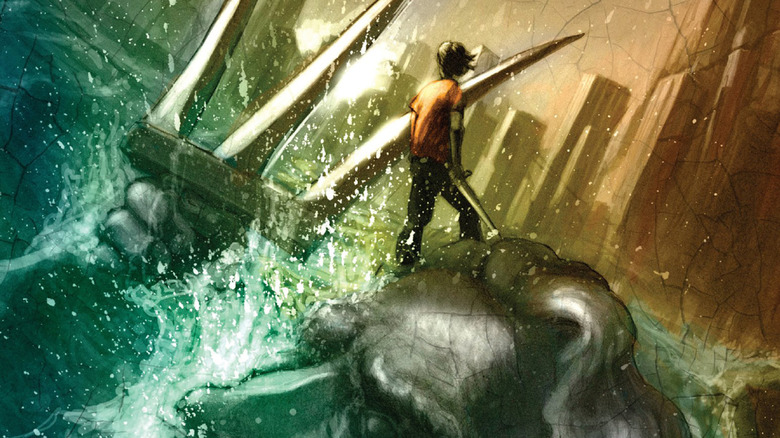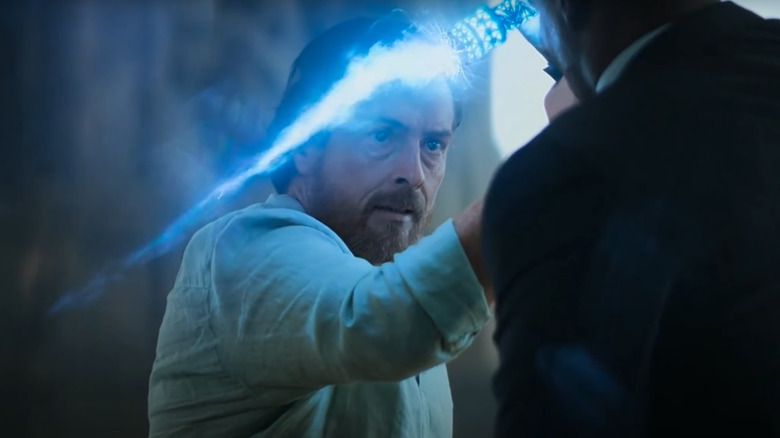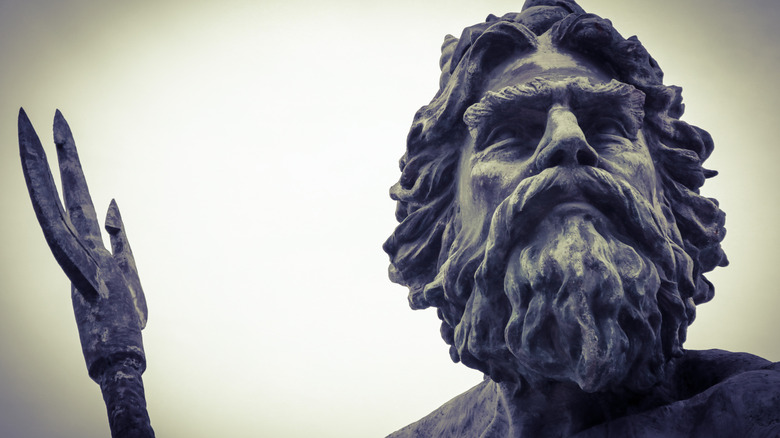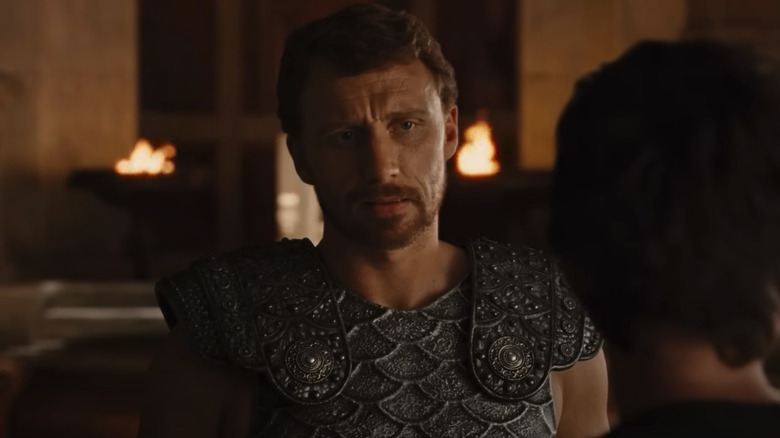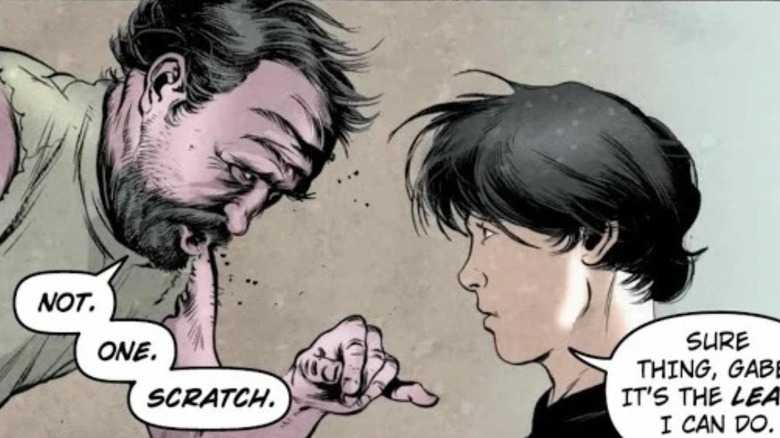Who Is Percy Jackson's Father - And What Does That Really Mean?
In the summer of 2005, American author Rick Riordan published "Percy Jackson and the Lightning Thief," riding the wave of the ascendent young adult fantasy genre away from the castles of the Wizarding World and the icy forests of Forks, Washington toward the hallowed halls of Olympus. Blending a new and much more complicated timeline with ancient Greek mythology, the story of Percy and Camp Half-Blood soon exploded into a rich and endlessly enjoyable world that beckons young readers to dive into legends stretching several millennia backward into the past.
Decades later, readers still love (and occasionally rank) the entire series as it continues to expand to incorporate other mythologies from across history. New fans were created by a short-lived film series in the early 2010s (which stopped just short of a trilogy) and a subsequent television series streaming on Disney+; when the latter was released in 2023, we hailed it as "a heroic coming-of-age story." Clearly, the Olympians still retain much of the magic as they did both when Riordan began his own quest and when ancient Greek storytellers captivated their audiences with tales of gods and monsters.
It's arguably this relationship between the past and future of storytelling that makes "Percy Jackson" exciting and accessible, as Riordan turns Greek legends into contemporary blockbuster heroes. One such hero is Percy's father, the Olympian Poseidon, whose presence in the series looms as enigmatic, powerful, and often perplexing.
Who Is Percy Jackson's Real Father & Why Is It Such a Big Deal?
Percy Jackson is the son of the principal Greek deity Poseidon, God of the Sea, member of the Olympian council, and one of the "Big Three" gods alongside brothers Zeus and Hades. In the 2010 film adaptation of "Percy Jackson and the Olympians," he is portrayed by "Grey's Anatomy" actor Kevin McKidd opposite Logan Lerman as Percy; in the Disney+ series, he is portrayed by Toby Stephens opposite Walker Scobell.
The Big Three are so named for being the most powerful of the Greek gods, virtually unrivaled in physical strength, elemental gifts, and political influence. But this power comes with a terrible cost. In the aftermath of World War II (which was fueled in part by covert Olympian intervention, with the children of the Big Three gods fighting their own war parallel to the humans), they began to realize just how capable their offspring were of shaping the mortal world, for better and, mostly, for worse. This realization was exacerbated by a prophecy from the Oracle of Delphi, which foresaw a child of the Big Three growing up with the power to preserve Olympus indefinitely or destroy it completely.
Because of this, the brothers come together to swear an oath not to sire any more demigod children — an oath that only takes the immortal Poseidon about five decades to break. In 1993, Sally Jackson gives birth to Perseus "Percy" Jackson, the very half-blood that would grow up to "preserve or raze" Olympus as he saw fit. Godly father that he is, Poseidon more or less avoids Percy until the boy arrives at Camp Half-Blood, his son's powers making his parentage unmistakeable to all who witness them.
Why Percy Jackson's Father Is Not the God You Remember
Though Percy Jackson's father, Poseidon, shares a name, title, and basic lore with the figure of ancient Greek mythology, the two could not be more different in regards to their personalities. To put it bluntly, he is — like most Greek gods — a truly monstrous creature of biblical proportions.
An embarrassingly huge portion of Greek deaths in mythology are attributed to the petty rivalry between Olympians, who traded absolute sovereignty over their respective domains for fealty to Zeus. Despite making this deal in exchange for greater access to the mortals who would worship them, it only embittered gods like Poseidon toward the King of Mount Olympus, with the former specifically using his dominion to send followers of his brother to watery graves time and time again as a show of force.
Similarly to his "Percy Jackson" counterpart, the Poseidon of ancient myth also had a difficult time controlling his libido. Even among Greek gods, his seemingly countless bizarre sexual encounters are shocking. (For any fans of the DC Comics character Aquaman, you probably have Poseidon to thank for the endless jokes about having sex with fish; legend has it there was nary a sea creature he couldn't or wouldn't seduce.) Consent in these encounters also often ranged from dubious to outright nonexistent, adding to the revoltingly selfish persona that clearly and harshly separates him from the stoic, flawed yet fatherly character seen in the novels and film/TV adaptations.
If you or anyone you know has been a victim of sexual assault, help is available. Visit the Rape, Abuse & Incest National Network website or contact RAINN's National Helpline at 1-800-656-HOPE (4673).
How Percy Jackson's Father Changes The Mythical Story
Given that Rick Riordan clearly wanted to translate Poseidon as not only a supporting character in a decidedly young adult franchise, but as an empathetic father-figure for the main character, he had to soften the Greek god's characterization, dramatically. The god's sexual personality is significantly muted, with Riordan painting him as a romantic hero whose heart defies any oaths sworn or conventions previously held. Though he, too, fails numerous times to perform the duties one would expect of a father, he also takes steps to take at least some responsibility for his children (which is more than you can say for most gods in Greek mythology).
Riordan directly adapts some of the Greek myths featuring Poseidon in "Percy Jackson's Greek Gods" and "Percy Jackson's Greek Heroes," reconciling as best he can the outlandish fables attributed to the Sea King and his characterization in the "Percy Jackson" series. As a result, his penchant for vengeance and inclination for petty acts of violence are largely restricted to mere terror, rather than the massacres they often were in myth. For example, if innocent people did die as a result of Poseidon's attempt to court the Nereid Queen Cassiopeia by summoning a great sea beast to her kingdom, Riordan doesn't make a point to linger on the fact. Instead, a limply regretful Poseidon shows grace by allowing the beast to be slain.
Other changes, however, should arguably be attributed to modern storytelling tropes and stylings. Poseidon is given traits such as a contemporary sense of humor, an easy-going personal vibe, honorable masculinity, and genuine kindness. While these are notable differences from the ancient Greek version, perhaps he would have been granted these traits if he had been created closer to today, especially considering the modern era's more benevolent interpretation of the sea in the absence of as many nautical deaths as the Greeks experienced.
What Happened to Percy Jackson's Other Father?
Of course, Percy Jackson wasn't actually raised by the God of the Sea. Just as Harry Potter had to suffer the Dursleys, Percy had to suffer his smelly step-ather, Gabe.
Gabe Ugliano is a small business owner who married Percy's mother, Sally, when Percy was just a toddler. Though he initially presents himself as a charming and amenable new member of their family, he quickly assumes the role of abusive tyrant. When he's not pretending to work or participating in what definitely seem like illegal poker games (playing with money stolen from Percy on at least one occasion), he's usually drinking himself into an irritable state in which he's one word or look away from taking his anger out on the nearest Jackson — usually Sally. It is heavily implied that Gabe physically assaulted her, in addition to subjecting her to near constant verbal, emotional, and financial abuse.
As horrifying as this all is, it is eventually revealed that Sally chose Gabe specifically for his revolting character traits, which manifest in a grotesque smell so powerful it literally confounds the senses of supernatural forces. Despite possessing a rather powerful scent himself as the son of Poseidon, no monsters were able to sniff out Percy's location until he was meaningfully separated from Gabe's disgusting aura.
Percy ultimately outgrows the need for such protection, thanks to the commencement of his training as a demigod warrior and housing at Camp Half-Blood. Thus, having served his purpose and shown neither remorse nor the potential for growth, Sally uses the severed but still deadly head of Medusa (whom Percy had slain at an earlier date) to turn Gabe into a lifeless stone sculpture. His frozen corpse is then sold as art, netting Sally a tidy sum to start her life as a free woman.
